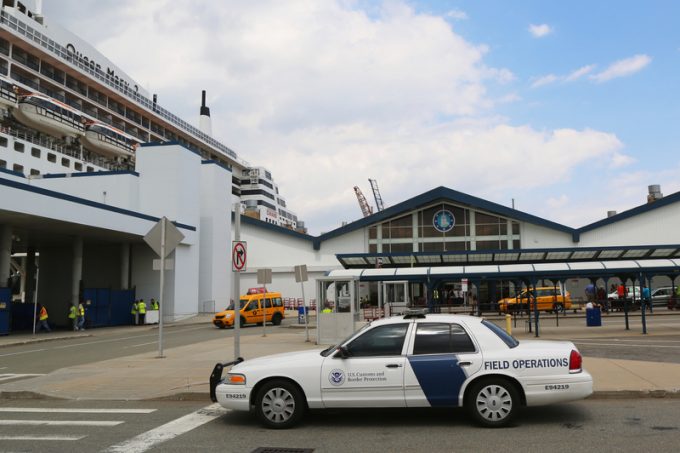Bangladesh looks at demurrage waiver as containers pile up in Chittagong
The Chittagong port yards now have close to 40,000 teu of containers, mainly loaded with ...
TFII: SOLID AS USUALMAERSK: WEAKENINGF: FALLING OFF A CLIFFAAPL: 'BOTTLENECK IN MAINLAND CHINA'AAPL: CHINA TRENDSDHL: GROWTH CAPEXR: ANOTHER SOLID DELIVERYMFT: HERE COMES THE FALLDSV: LOOK AT SCHENKER PERFORMANCEUPS: A WAVE OF DOWNGRADES DSV: BARGAIN BINKNX: EARNINGS OUTODFL: RISING AND FALLING AND THEN RISING
TFII: SOLID AS USUALMAERSK: WEAKENINGF: FALLING OFF A CLIFFAAPL: 'BOTTLENECK IN MAINLAND CHINA'AAPL: CHINA TRENDSDHL: GROWTH CAPEXR: ANOTHER SOLID DELIVERYMFT: HERE COMES THE FALLDSV: LOOK AT SCHENKER PERFORMANCEUPS: A WAVE OF DOWNGRADES DSV: BARGAIN BINKNX: EARNINGS OUTODFL: RISING AND FALLING AND THEN RISING

A serious shortage of customs inspectors is affecting operations at US ports and threatens to disrupt supply chains.
The Association of American Port Authorities (AAPA) has called on the Customs & Border Protection agency (CBP) as well as Congress to secure adequate allocation of resources to the ports.
In a letter to acting CBP commissioner Kevin McAleenan, AAPA president and CEO Kurt Nagle wrote: “There is an immediate need to focus on long overdue resources for maritime ports and to resolve the CBP staffing shortages to ensure the security of passenger and freight facilities.”
The AAPA pointed out that both cargo volumes and passenger numbers passing through US ports had risen considerably, but CBP staffing levels in these sites remained more or less static.
John Young, director of freight and surface transportation policy, noted that in fiscal 2015, Congress authorised funding for the recruitment of 2,000 new CBP staff, but fewer than 20 were deployed at seaports.
CBP has indicated that it could use an additional 500 staff just on the maritime side, he added.
He has been contacted frequently by port directors expressing concern about the situation, Mr Young reported. The problem is affecting ports in every region, albeit in different ways, he noted.
Ports in the Pacific north-west are coping with large volumes of containers, those in Florida face challenges from cargo volume as well as increasing numbers of cruise passengers, while ports in the mid-west need resources for business development purposes, he said.
The shortfall of CBP staff is taking a toll on ports, logistics providers and consignees.
“Annual increases in volume and periodic surges in ship traffic have continually led to repeated dockside delays in inspecting and clearing cargo. Ports continue to struggle with balancing a CBP staffing shortfall against security threats and business demands,” Mr Nagle wrote in his letter.
For a number of container ports, the problem has been compounded by the arrival of ultra-large container vessels, straining port resources and infrastructure.
However, in terms of customs clearance, they appear to have coped so far, Mr Young said. He attributed this to ports’ use of measures to alleviate the CBP staff shortage, above all the Reimbursable Services Program, authorised by Congress, which gives ports leeway to pay overtime costs of customs officers. However, some ports do not have the resources for this, he added.
In any case, the progamme is not geared to address the issue in the long run. “It is not a long-term solution,” Mr Young commented.
To some extent, the CBP staff shortage is caused by the agency’s recruitment policy, he said. For one thing, CBP has a very stringent polygraph testing requirement, which has produced a fail rate as high as 68%, he noted. Moreover, new recruits routinely start their career at the southern border – of little help to ports, Mr Young added.
He welcomed recent moves by the CBP to recruit military veterans, which has produced encouraging results in Virginia.
The shortage of CBP personnel at seaports was raised again at a Congressional hearing on security last month, when two senators asked the CBP commissioner about this and he acknowledged the problem.
Mr Young stressed the need for Congress, CBP and the AAPA to work together towards a resolution.
Funding may well be an issue, given allocations in the government’s budget and demands on other areas. The preliminary budget proposal for 2018 released in March by the administration envisages $16.2bn to go to the Department of Transportation’s discretionary budget, which would mark a 13% cut from the current year’s allocation.
Meanwhile, the Department of Homeland Security, alongside the Coast Guard and the port authorities of Los Angeles and Long Beach, have called for additional funding for port security after an unauthorised entrant died at the port of Los Angeles in August.
Comment on this article
Michael Perez
November 15, 2017 at 3:04 pmPerhaps they need to look at employing inspectors over 55 years in age, who are dependable, show up to work everyday on time, don’t abuse drugs or alcohol. There are many of us in good health who can do the work that would appreciate such employment